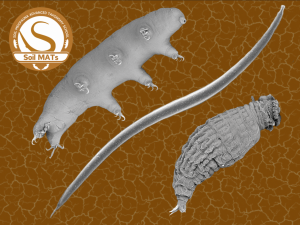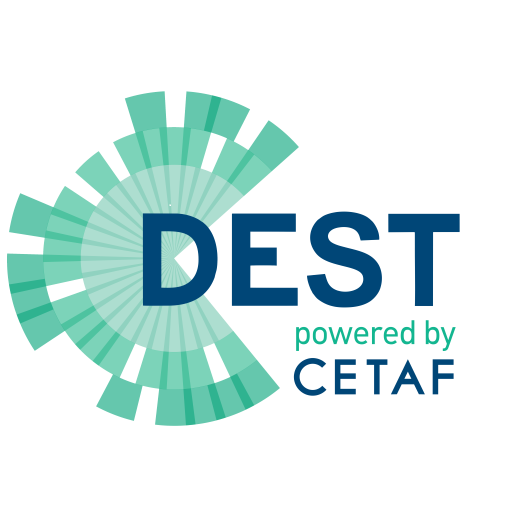
Description
Train a new generation of taxonomists expert in soil biodiversity and ecology with a special focus on Nematoda, Tardigrada, and Rotifera phyla. This high-level training course on soil ecology and its fauna will teach about the biodiversity of the surface of and within the soil and how to identify some macrofauna and microfauna taxa. Among these, special attention to the hydrophilic meiofauna taxa in soil, often neglected mainly due to the paucity of expert taxonomists, will be given.
The training is a mixed online OnDemand (~60 hours) and Face to Face (120 hours in 15 days) activities from April to August 2025. In particular, the participants will be involved in an online OnDemand theoretical training about soil environment and its fauna in April and May and in three face-to-face hands-on workshops: one in Czechia focused on rotifers’ taxonomy in May, one in Germany focused on nematodes’ taxonomy in July, and one in Italy focused on tardigrades’ taxonomy in August. Each face-to-face session comprises one day of sampling on the field and four laboratory activities/lectures days for a total of 5 days.
Call Opening: November 1, 2024
Application deadline: Registration has closed on December 20, 2024
Response date: January 25, 2025
For any additional information write to evozoolab@unimore.it.
Trainers
TETTRIs experts (online support):
- Dr Iasmi Stathi (soil macrofauna-arthropoda) (NHMC-UoC, Greece) is a biologist with a PhD in Taxonomy, Ecology and Phylogeography of Scorpions (Arachnids) and a certified adult educator. She belongs to the Laboratory Teaching Staff of the School of Science and Engineering of the University of Crete; she is the Head of Education of the Natural History Museum of Crete of the University of Crete (NHMC-UoC) and the coordinator of the Training and E-learning Working Group of the Consortium of European Taxonomic Facilities (CETAF). She has twenty-four years of experience in Environmental Education, Higher Education, Lifelong Learning and Educational Research & Development Programs in the NHMC-UoC, the Technical University of Crete and the Hellenic Mediterranean University of Crete. She has participated in more than 20 Research/Educational programs funded by either national or European funds and has 29 publications in peer-reviewed scientific journals.
- Dr Eleftherios Bitzilekis (soil macrofauna-gastropoda) (NHMC-UoC, Greece) is a biologist that holds a PhD from the University of Crete, on studying the Phylogeny, Ecology and Biology of the land snail genus Metafruticicola in the north-eastern Mediterranean, as well as a master’s degree in Evolution, Ecology & Systematics from Ludwig Maximilian University of Munich. He has over 15 years of experience in taxonomy in several projects and over 7 years of experience in soil macrofauna, specifically in land snails. Fieldwork experience includes the European continent (Aegean Archipelago, Balkan Peninsula, southern Germany), Asia (Middle East) and South America (French Guyana).
The SoilMATs expert taxonomists (Advisoring):
- Dr Roberto Guidetti (Soil Microfauna-Tardigrada) (University of Modena and Reggio Emilia, Italy) is an associated Professor of Zoology. His research is devoted to evolutionary biology and biodiversity in extreme environments with a taxonomic expertise in Tardigrada. He has been visiting researcher in USA (East Tennessee State University) and Sweden (Lund University) and has served as PI of several projects on tardigrade biodiversity and on adaptations to extreme environments, and co-organiser of six international symposia. Besides, he was curator of the Museum of Zoology and Comparative Anatomy for 4 years. He was involved as component of the board of the Italian Zoological Union and is currently part of the doctorate school of Polar Science (Ca’ Foscari University, Venice, Italy) and of Models and Methods for Material and Environmental Sciences (University of Modena and Reggio Emilia, Italy) boards. He produced 134 publications and book chapters.
- Dr Karin Hohberg (Soil Microfauna-Nematoda) (Senckenberg Gesellschaft für Naturforschung, Germany) is a researcher at Senckenberg Museum of Natural History Görlitz, head of Nematoda Section in the Soil Zoology Department and the curator of the Nematoda and Tardigrada collection at Senckenberg – Leibniz Institution for Biodiversity and Earth System Research. Her research is devoted to soil ecology, biodiversity and food webs with a taxonomic expertise in soil Nematoda. She has served as PI of several projects on soil ecology and biodiversity, with a focus on extreme environments e.g., natural carbon dioxide vents, post-mining sites, Antarctic soils and desert sands in the Namib and Atacama. She has been lecturer at the International Hochschulinstitut, Dresden Technical University in the master programmes “Biodiversity and Collection Management” and “Organismic and Molecular Biodiversity”. She wrote more than 60 scientific articles and book chapters.
- Dr Miloslav Devetter (Soil Microfauna-Rotifera) (Biology Centre CAS – Institute of Soil Biology and Biogeochemistry, Czech Republic) is a researcher at Biology Centre CAS – Institute of Soil Biology and Biogeochemistry. His research is devoted to ecology and taxonomy of soil microfauna, in particular rotifers, extreme environments, polar and alpine soils, caves, and cryoconite holes with a taxonomic expertise in soil and interstitial rotifers (mostly bdelloids). He participated to many research expeditions, mostly to the Arctic (Svalbard), the Himalayas, and the African mountains. He teaches at the University of South Bohemia and at Masaryk University (Brno). He has served as PI or co PI of a number of research projects on soil fauna and their relation to environment, soil organic carbon and effect of fire on soil conditions and organize or co-organize five international symposia. He produced 64 papers.
The SoilMATs Trainers:
- Edoardo Massa (Italy)
- Daniele Camarda (Italy)
- Julian Escher (Germany)
- Michala Tůmová (Czech Republic)
- Marco Antonio Jiménez (Czech Republic)
Dates of Training period – Duration
April to August 2025
Location
University of Modena and Reggio Emilia, Modena (Italy) (Giardino Esperia, Sestola)
Senckenberg Museum of Natural History, Görlitz (Germany);
Biology Centre Czech Academy of Science, Branišovská (Czechia);
Online.
Course’s language
English
Target audience
The application is open to European citizens or people who are currently involved in a European research institution/university; third-year bachelor students, master’s students, graduate students, PhD students, post-docs for a maximum of 5 years after the PhD. Degrees in biology, forestry, agriculture, and natural sciences. Good level of knowledge of English language (i.e., B1 or above).
Fee
The school enrolment is free. Expenses for training fees, travels from European localities, transports during the workshops, food, and accommodations are covered by SoilMATs project. All the other costs are at the expenses of participants.
External funding/sponsoring
This project has received funding from the European Union’s Horizon Europe Research and Innovation program within the framework of the TETTRIs Project funded under Grant Agreement Nr 101081903
Registration deadline
Registration has closed on 20 December 2024
Mode of trainees’ assessment
Test
Participant quota (min and max number of trainees)
1-20
Types of training/ Implementation method
1.Theoretical modules/Face to face
High level training course on surface and soil-living animals and their ecology
2. Field – Lab work/Face to Face
A special focus will be given to methods for samples collection, taxonomy, and ecology of the phyla Nematoda, Rotifera, and Tardigrada.
3. Lab work/Face to face
Advanced species identification techniques. Animals extraction, specimens preparation and processing for microscopies, molecular analyses, and in silico analyses of the acquired data will be addressed.
Training Course learning outcomes
- Knowledge on surface and soil-living animals and their ecology.
- Taxonomy, systematic, and ecology of the phyla Nematoda, Rotifera, and Tardigrada.
- Advanced integrative taxonomy techniques for micrometazoans.
Certifications provided
- Certificate of Attendance by SoilMATs and CETAF DEST with 7.2 ECVET Units (European Credit system for Vocational Education and Training);
- Certificate by SoilMATs and CETAF DEST according to Europass Certificate Supplement (certifying analytically the knowledge, skills, competencies and behaviours gained);
- ECTS Credits for students in case of a university participant (optional).
What trainees need to bring
- Laptop
- Hiking clothing and boots
- Lab coat
Additional information
For your registration please download the following CV sample
More details: dest@cetaf.org
